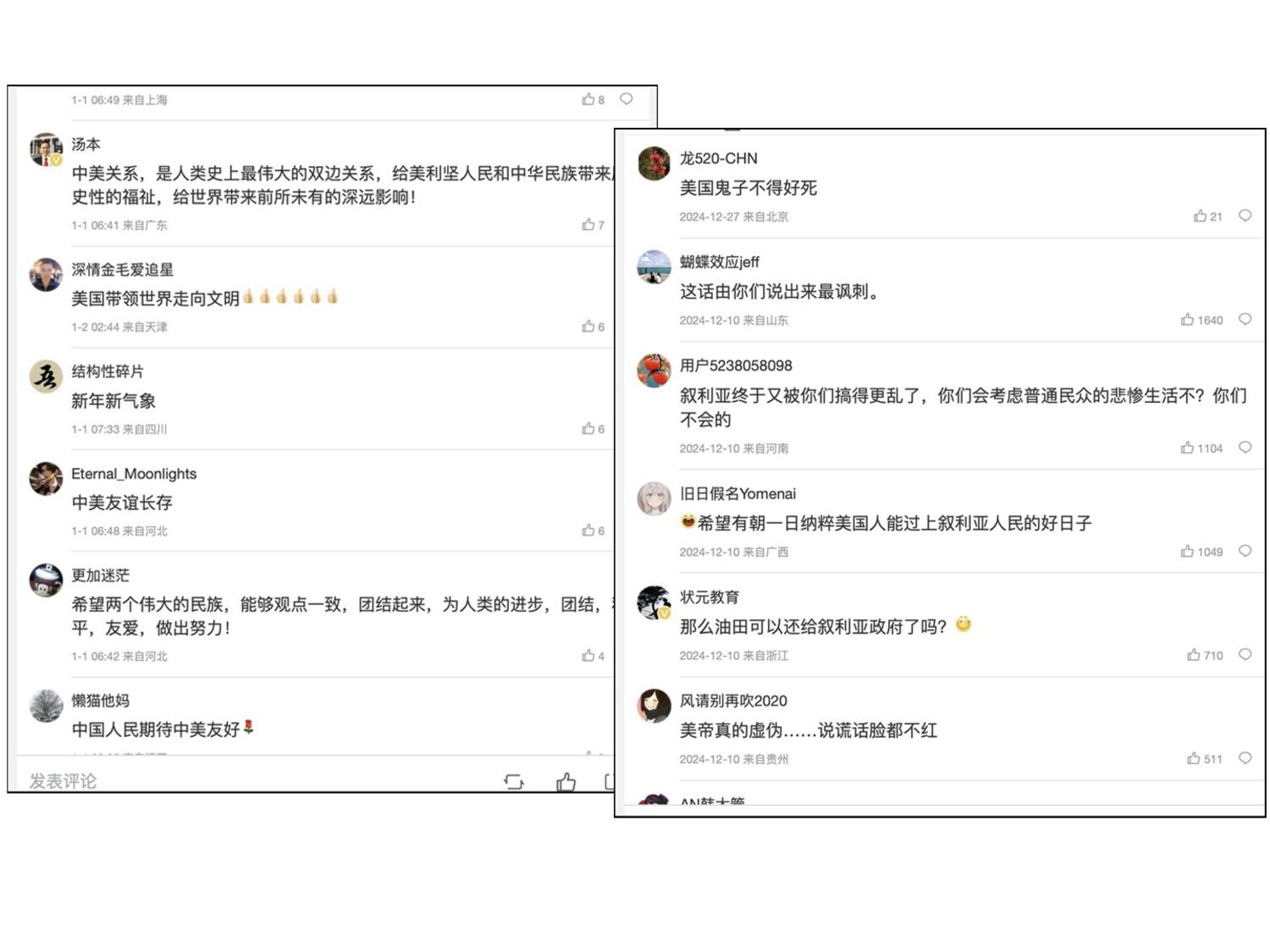Comments on the U.S. Embassy’s Weibo social media account are striking an overwhelmingly positive note about Sino-U.S. ties, suggesting the Chinese Communist Party’s “public opinion management” system that governs and manipulates online comments wants to send a kinder message ahead of the Jan. 20 inauguration of President-elect Donald Trump, analysts told Radio Free Asia.
In China’s tightly controlled social media environment, comments are widely deleted if deemed politically taboo, but also written to order by an army of pro-government commentators hired to deliver “public opinion” that suits the Communist Party’s political priorities.
The social media accounts of Western embassies and consulates in China have long been a focus for the country’s “little pink” nationalists, and an opportunity for Chinese to vent their frustrations at foreign governments.
But a New Year’s Day article from the U.S. Embassy looking back at the bilateral relationship since 1979 suddenly garnered several hundred comments mentioning “Sino-U.S. friendship” instead, suggesting that the ruling Chinese Communist Party’s “public opinion management” system has switched priorities ahead of Trump’s inauguration on Jan. 20.
“The China-U.S. relationship is the greatest in human history,” gushed one comment under the Weibo version of the article. Another said, “Sino-U.S. friendship will last forever,” and another said the countries wielded “unprecedented and far-reaching influence” in the world.
Comments underneath a U.S. Embassy Weibo post about the death of former U.S. President Jimmy Carter also took a more positive tone.
“I hope China and the U.S. will put the interests of their two peoples first, respect and understand each other,” said one comment.
‘American devils’
The comments were in stark contrast with previous comments on U.S. Embassy posts, which would once typically say something like: “Enjoy the holiday, American devils, and don’t interfere with China.”
Chinese state media recently launched a campaign to highlight friendly cooperation with the United States in an attempt to improve turbulent ties as Trump prepares to take office, an analyst said.

The state-run People’s Daily and Global Times, which often carry searing criticism of the United States, called on Dec. 25 for written work, photos and videos from people and organizations around the world with the aim of “bridging cultural differences and fostering friendship and trust” with the United State.
Xi has said he’s ready to work with the Trump administration, but has also warned that both countries stand to “lose from confrontation,” as Trump announced plans to impose tariffs of at least 60% on Chinese imports.
The new president also recently nominated several China hawks to top foreign policy positions, amid concerns that a Trump administration could be further bad news for China’s flagging economy.
RELATED STORIES
China expecting harder times after Trump victory
Chinese media campaign to foster US ‘friendship and trust’
Trump ‘invited’ China’s Xi to inauguration in Washington
U.S.-based legal scholar Teng Biao said the shift in tone is almost certainly the result of orders from the top.
“Under China’s media [and social media] controls, all directions taken by its nationalism are laid down by the Chinese Communist Party,” Teng told RFA Cantonese in a recent interview, adding that China has been internationally isolated for several years.
“That isolation will make things harder and harder in China, so the Chinese Communist Party has a political need to manipulate an apparently positive nationalistic mood, in order to ease ties with the U.S. or Japan,” Teng said.
“The relationship between China and the United States is a bit of a paradox for the Chinese government,” Teng said. “If it’s managed well, it will be beneficial to the Chinese Communist Party, and enable China’s economy to grow better.”
“But exchanges with the West will also bring in ideas of freedom and openness that Beijing doesn’t want to see,” he said.
‘50-cent-army’
China deploys thousands of internet commentators dubbed the “50-cent army” to generate pro-government posts on social media.
Their exact numbers are unknown, but their job is to try to swing the opinions of Chinese netizens in the direction of the status quo and to deflect criticism and dissent among the country’s 900 million internet users.
U.S.-based current affairs commentator Zang Zhuo said the comments were almost certainly manufactured.
“I have seen various comments on Weibo, which seem to be a 180-degree turnaround in Chinese netizens’ attitude towards the United States,” Zang said. “But these aren’t the real voices of the people … because they are all directed by the government.”
“Chinese online opinion does as it is told.”
Zang said it’s unlikely to be an effective way to ease ties with Washington.
“Does this change in attitude mean that Sino-U.S. relations will ease, or get closer and more cooperative?” Zang said. “I don’t think so.”
“The international environment has completely changed … so unless the Communist Party loses power, I don’t think there’s much hope of that.”
Translated by Luisetta Mudie. Edited by Malcolm Foster.
This content originally appeared on Radio Free Asia and was authored by Yitong Wu and Pan Jiaqing for RFA Cantonese.
This post was originally published on Radio Free.